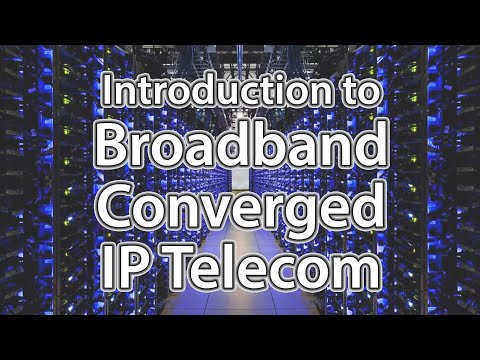Watch in full quality: https://www.teracomtraining.com/online-courses.htm#2241
Course 2241 Introduction to Broadband Converged IP Telecom: Convergence • Broadband • Network Core and Edge • Protocols • Last Mile Network Access • Residential, Business and Wholesale Services • Network Equipment • Carrier Connections
Introduction to Broadband Converged IP Telecom is the first course in the TCO CTNS Certification Package, delivering a high-level introduction to the world of modern IP telecommunications.
https://www.teracomtraining.com/online-courses-certification/teracom-overview-ctns.htm
This lesson is the introduction to the course.
This course is based on the beginning of Teracom’s famous instructor-led BOOT CAMP, getting a full week of training started with an introduction to all of the different aspects of the modern converged IP telecom network.
This introductory course is designed specifically for non-engineering professionals to be a first pass through the topics, explaining the fundamental ideas, jargon, equipment and technologies, the services that are sold, the players, where the money is, and how it all fits together… without bogging down in details on any particular topic.
In subsequent courses, we’ll take another pass and drill deeper into key areas like Wireless, VoIP, PSTN, Ethernet, IP and MPLS.
Course Outline
1. Introduction
Course introduction and overview
2. Convergence
One network carrying all services: telephone, video and Internet. Channels vs. packets.
3. Broadband
Bandwidth, and how much “broad” might be
4. Broadband Converged IP Telecommunications Model
Graphical model identifying all the main aspects of telecommunications and how they relate
5. The Network Core
High-capacity, high-availability connections between aggregation centers. Fiber rings.
6. Network Protocols: Ethernet, IP and MPLS
Ethernet moves packets point-to-point. IP address is the final destination. MPLS manages flows.
7. Network Access: The Last Mile
Twisted pair, hybrid fiber-coax, Passive Optical Network, Optical Ethernet, cellular, satellite
8. Anatomy of a Service
Network access technology, network connection type and billing agreement
9. Services: Residential, Business and Wholesale
Comprehensive review of the main dollar-value services in each sector
10. Network Equipment
Layer 2 switches, IP routers, MPLS routers, FDM and TDM multiplexers, wavelength cross connects
11. Carrier Network Interconnect
Tariffed switched-access for calls involving a PSTN phone number; Internet Exchange transit and peering
Prerequisites
None.
Course Objectives: What You Will Learn
After taking this course, with the book open, you will be able to:
- Define convergence, and two ways that it might be achieved
- Define bandwidth, explain what broadband means and how much “broad” might be
- Identify all of the main aspects of the modern broadband converged IP network, including the parts of the physical network, the three types of services, the equipment and players
- Describe the network core, its purpose, performance requirements and how they are implemented
- Identify the three primary network protocols: Ethernet, IP and MPLS, and what each does
- Explain how MAC Frames and IP Packets go together
- Identify the essential purpose of an IP address
- Explain the essential advantage of MPLS over IP for routing
- Define the three main technology areas for network access
- List the most popular technologies in each
- Describe the three components of a network service
- Define the three main groupings of telecom services based on customer type
- Describe at least four different meanings of the term VPN
- Differentiate between streaming video vs. video from your ISP, and the essential difference between them
- Explain in general what an MPLS VPN is and who uses it
- Identify the key difference between MPLS VPN services and SD-WAN services
- Explain what SIP trunking is and what legacy service it replaces
- List at least four types of wholesale telecommunications services
- Explain what a Data Center is
- Explain the essential function of a router
- Describe what a Layer 2 switch is used for, and how Layer 2 switches relate to routers
- Define multiplexing
- Identify three technologies that use Frequency-Division Multiplexing
- Identify the name for FDM in the fiber optic world
- Differentiate between FDM and Time-Division Multiplexing
- Describe what a gateway is and the two functions it performs
- Identify the two main ways that carriers connect, and where this happens
This is quite a range of knowledge, and can appear daunting, especially if you are new to telecom. Don't panic. This course is the introduction, the first pass through all of these topics. We go back over them again later.
No-one is expecting anyone to be an instant expert!
In this course, we’re getting started with a big picture view of modern broadband converged IP telecommunications.
